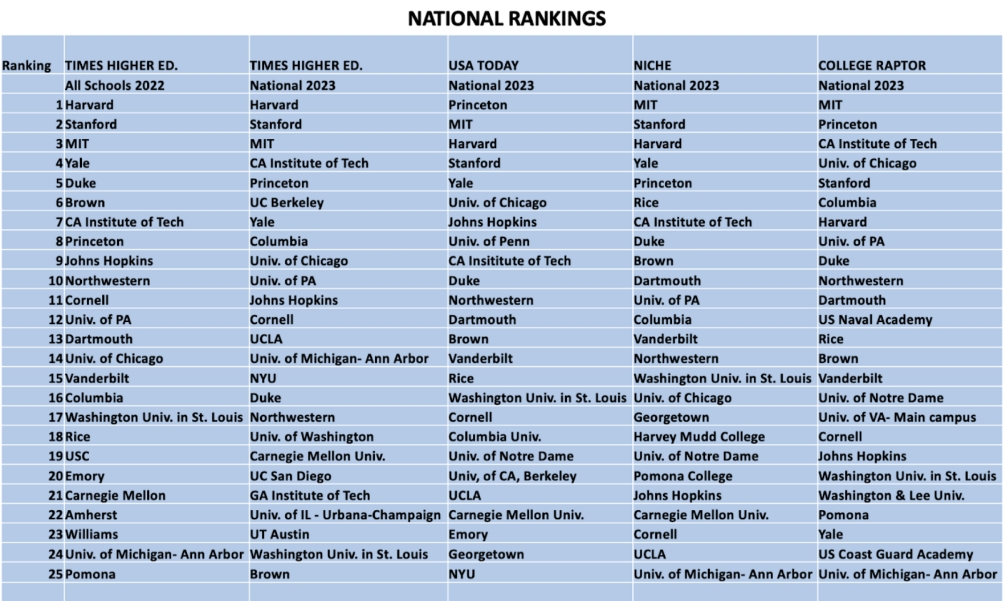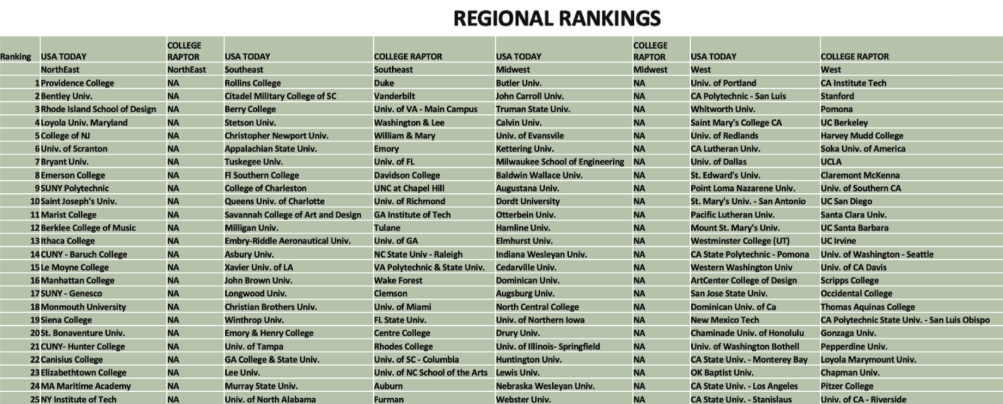So, you're on the lookout for the ideal college. Well, college rankings can be a real game-changer in your quest to find the perfect fit. They're like a trusty compass, guiding you through the maze of options and helping you make an informed decision.
This page is all about college rankings - how they're figured out, what factors they consider, and how to use them to compare different schools. We'll even give you the lowdown on today's top-ranked schools.
Get ready to dive into the world of college rankings and discover the key to finding your dream college!
How are college rankings determined?
When it comes to college rankings, each institution, company, and website has its own take on what makes a college stand out.
Each ranking source may consider different factors, but don't worry. Despite the variations, some common factors usually make the cut and provide a good starting point for comparing colleges.
In the next section, we'll dive into the factors that tend to pop up in rankings, giving you a solid understanding of what to look for when exploring different schools.
Factors affecting college rankings
When it comes to college rankings, several factors commonly influence the rankings and provide insights into each college's quality and reputation. Let's look at some.
- Graduation rate. It's all about crossing that finish line. Graduation rates show the percentage of students who earn their degrees within a specific time frame, such as four or six years. High graduation rates indicate a college is doing something right - keeping students engaged, supported, and on track.
- Student resources. We're talking about all the goodies colleges offer to enhance the student experience. This includes libraries, research facilities, computer labs, and access to state-of-the-art equipment. The more resources available, the better equipped students are to excel in their studies.
- Academic reputation. Reputation matters. Academic reputation looks at how a college is viewed in the academic world. Professors, employers, and industry professionals weigh in with their opinions. It's like being the cool kid at the academic party. A strong academic reputation means the college has a solid track record for delivering quality education.
- Faculty quality. The people who are teaching you can make a big difference. So, colleges with highly qualified faculty members tend to score well in rankings. Their qualifications, teaching experience, research contributions, and real-world industry experience all come into play.
- Student-to-faculty ratio. Picture this: You're in a classroom with the professor's undivided attention. That's what a low student-to-faculty ratio means. It's all about having smaller class sizes and more personalized interactions with your professors. Colleges with a lower ratio tend to get a bump in rankings because students get more individualized attention.
- Financial resources. Money talks, and it can make a difference in a college's ranking. Schools with higher financial resources can invest in better programs, facilities, and student support services. A bigger budget can make things happen and contribute to a top-notch education. They can also offer more financial aid to students, which can be incredibly helpful for prospective students who don't want to take out student loans.
- Alumni success and outcomes. This one is all about what happens after graduation. How successful are the alum? Are they finding good jobs? Getting into grad school? Making bank? Colleges that produce successful alum often score higher in rankings because it shows their programs set students up for real-world success.
Keep in mind that different ranking systems might give different weights to these factors or even consider additional factors. So, dig into the details and see what matters most to you when considering which college is the right fit.
How to compare college rankings
You might be tempted to visit the websites of ranking organizations like U.S. News & World Report, USA Today, or Times Higher Education to learn how each college compares.
However, and this is a BIG however, ratings can be very volatile and rankings can be highly inconsistent among the different sources. Not to mention, each source's rankings might consider factors you don't even care about. This can make it difficult to get a true feel for how colleges actually rank based on your preferences.
For example, these charts show how different ranking organizations compare nationally, regionally, and for liberal arts colleges. It might make your head spin!



Easily compare your top schools with College Rover
Want a comprehensive comparison tool to give you the lowdown on rankings during your college search? Look no further than College Rover.
Use College Rover to filter schools based on your preferences, compare them head to head, and get a personalized ranking of your top colleges - it's almost like your own college scorecard.
This way, instead of looking at a ranking made with every student in mind, you can have a ranking that's tailor-made to suit your specific wants and needs.
Are college rankings important when choosing the best college for you?
College data and rankings can give you some useful information about universities, but take it with a grain of salt. This is just one piece of the puzzle when figuring out which college to attend.
Here's what to consider:
- Program strengths. Rankings can give you a glimpse into specific academic programs or departments. If you know what you want to major in, seeing how well a university performs in that area can be handy. But remember, rankings might not capture all the little differences between individual programs.
- Resources and facilities. Highly ranked universities often have awesome resources like libraries, labs, and research centers. These things can really amp up your learning experience and give you opportunities to get involved in research and other cool scholarly activities.
- Peer comparison. It's helpful to see how a particular school stacks up against others with similar characteristics or academic focus. This kind of comparison gives you an idea of where a university stands among its competitors.
- Limitations and methodology. It's important to understand how rankings are put together. Different ranking systems use different criteria, like faculty quality, student-to-faculty ratio, graduation rates, and what alum achieve. Some rankings put a lot of weight on college admissions numbers or research output, while others focus on undergrad satisfaction. Consider whether these factors align with what you care about.
- Subjectivity and biases. Personal opinions, biases, and even commercial interests can influence rankings. Some rankings prioritize things like test scores, enrollment numbers, and school selectivity or endowment, which may not align with your values or goals. Take a broader view to evaluate a university's strengths and weaknesses.
In the end, college rankings shouldn't be the be-all and end-all of your decision-making. Consider other college comparison stuff, like location, campus vibe, cost, scholarships, support services, internships, and extracurricular opportunities.
Really understanding what a university is like is important. Visit the campus, chat with current students, check out campus life, stroll around the dorms, and dig deep into the specific programs or departments that interest you.
Ultimately, picking the right college should be a personal decision that reflects your own needs, dreams, and values. College rankings can be handy, but you should weigh them alongside all the other important factors that matter to you.
Compare the best colleges for you with College Rover
High school is almost over, and it's time to make the big decision: What colleges will you apply to and what type of education will you seek?
While college rankings can be helpful with determining the schools you might be interested in applying to, coming up with a personal list of what you want out of your college experience is more important.
College Rover can help you research schools, programs, and more based on what you actually want! Don't settle on any college - find the best schools for you with College Rover.










.jpg)











